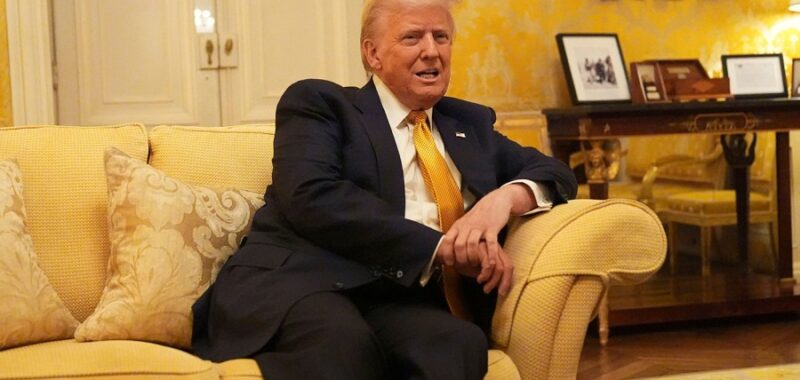
President-elect Trump is signaling he plans to lean on appointed czars to carry out his plans in key policy areas, specifically when it comes to immigration and energy production, centralizing power within the White House.
One of Trump’s first appointments after winning November’s election was Tom Homan as border czar. He has since said Doug Burgum, his nominee for Interior secretary, would serve as energy czar, and venture capitalist David Sacks has been tasked as a czar for artificial intelligence and cryptocurrency.
The decision to appoint czars for those subject areas underscores Trump’s desire to both show he is prioritizing issues like immigration and energy, and to avoid relying on Senate-confirmed nominees at sprawling agencies to implement his agenda.
“The creation of czars can at least, even if Trump is bound to use preexisting legal authority to affect change in these policy areas, it does politically help them because this signals to the media and the public that these are important areas,” said Mitch Sollenberger, a professor at the University of Michigan-Dearborn and author of the book “The President’s Czars: Undermining Congress and the Constitution.”
Trump’s decision to name Homan as border czar came within days of winning the election. The move signaled how Trump intended to follow through on his immigration pledges from the campaign trail, namely his calls for mass deportations of those in the country illegally.
Homan, a former top official at Immigration and Customs Enforcement (ICE), has already been omnipresent on Fox News, appearing on the network regularly to discuss his trips to the southern border and meeting with local officials, including New York City Mayor Eric Adams this week. Trump in recent interviews has signaled mass deportations will begin on his first day in office, though it is expected to be a logistically and financially complicated undertaking.
Another of Trump’s major campaign pledges was to bring down energy costs by increasing drilling. For that, he has tapped North Dakota Gov. Doug Burgum (R) for the dual role of Interior secretary and energy czar.
Burgum is expected to lead a newly formed National Energy Council, which Trump said will oversee “all Departments and Agencies involved in the permitting, production, generation, distribution, regulation, transportation, of ALL forms of American Energy.”
And Trump has chosen David Sacks, a Silicon Valley billionaire, to serve as his czar on the emerging areas of artificial intelligence and cryptocurrency. Sacks will also lead the Presidential Council of Advisors for Science and Technology, Trump said.
Trump has become increasingly friendly to the cryptocurrency industry, and he and his family have launched their own digital currency. But the AI and crypto spaces are still largely unregulated, and Sacks could play a key role in helping to develop guidelines for those industries moving forward.
There are other officials joining Trump’s administration without the title of “czar” but who may be accountable only to Trump, such as Peter Navarro on trade issues.
“He’s not the first president to do this, right, and what it does is centralize White House power and authority,” a Republican lobbyist told The Hill. “What it does necessarily is it continues the reduction of power of the Cabinet officials.
“You have this rim of people who, many of whom accumulate their own staff, they have a direct line to the president, they speak to with authority, potentially for the president,” the lobbyist added.
Trump’s reliance on czars is not new for a president. Presidents have for decades used “czars,” both through official titles and through more formal appointments that are branded as “czars.”
William Bennett was the director of the Office of National Drug Control Policy during the George H.W. Bush administration, but was known as the drug czar. Then-President Barack Obama tapped Ron Klain to coordinate the federal response to Ebola, though Klain was informally known as the Ebola czar.
Trump himself tapped Dr. Moncef Slaoui as a coronavirus vaccine czar in 2020 to help carry out Operation Warp Speed.
Sollenberger noted that the increasing reliance on czars can help centralize power within the White House. It can also allow a president to install officials who may otherwise struggle to win Senate confirmation, and it can make congressional oversight more difficult both because White House appointees may enjoy more privilege when it comes to testimony, and because their roles may not be as defined as a Cabinet official.
“If you step back from the czars moniker itself, this is about presidential management of the executive branch,” Sollenberger said.
“It’s the policy and the political. You combine those two with this solution,” Sollenberger said. “You bring something to light, you give it its own spotlight, and it has the attraction at least for presidents that they can do that while not necessarily having to go through traditional pathways of affecting policy.”

